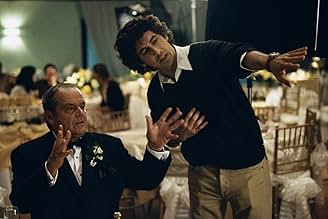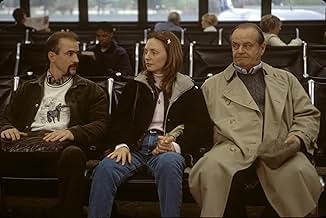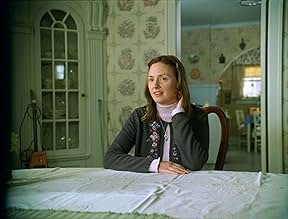Um homem aposentado embarca em uma viagem ao casamento de sua filha, apenas para descobrir mais sobre si e a vida que esperava.Um homem aposentado embarca em uma viagem ao casamento de sua filha, apenas para descobrir mais sobre si e a vida que esperava.Um homem aposentado embarca em uma viagem ao casamento de sua filha, apenas para descobrir mais sobre si e a vida que esperava.
- Direção
- Roteiristas
- Artistas
- Indicado a 2 Oscars
- 25 vitórias e 71 indicações no total
James M. Connor
- Randall's Best Man
- (as James Micheal Connor)
Marilyn Tipp
- Neighbor Lady
- (cenas deletadas)
- Direção
- Roteiristas
- Elenco e equipe completos
- Produção, bilheteria e muito mais no IMDbPro
Avaliações em destaque
This is an inspiring story. It teaches me so much about what is important in life. Jack Nicholson, with a great performance as Warren R. Schmidt is an example of an American middle class after retiring. For many years he has worked as an actuary at a big insurance company. After retiring, Jack at home, while watching television, he decides to sponsor a six years old boy (Ndugu) from Tanzania. Sending a check of US$ 22,00 every month, he is also required to write a letter to the boy. In the process of writing these letters, he vents out to the boy about his life frustrations, his lost dreams and the dilemma he is in. He is married for forty-two years with his wife Helen (June Squibb) and he has a daughter living in Denver, Jeannie Schmidt (Hope Davis) who will marry a looser pretty soon. He misses his daughter. A few days after his retirement, his wife dies, and Jack realizes how important the wife was in his life now even though he never appreciated her. The director of the movie, Alexander Payne takes the audiences with Jack on a trip in a trailer to visit specific places in America. He mainly makes Jack visit the places where he has been before physically but at the same time Jack was revisiting his own life inside. In this trip he realizes what really matters in life - friendship, family and sharing- then why it is important to appreciate them whenever you have a chance.
In 'Citizen Kane' (1941), the director Orson Welles portrays the same idea when creating Mr. Kane. The movie is more than the story of a tycoon's rise and fall; it is an account of what is ultimately important in a person's life. Even though Kane attains riches and prestige, he is far from happy. He ends with two failed marriages and few friends. At his dying bed, all he has left is his reminiscences - and something called "Rosebud." In 'About Schmidt' the director Alexander Payne uses voiceover to convey Jack's thoughts and memories throughout the movie. To be specific it is when Jack is writing a letter to the boy he sponsors - (Ndugu), at the same time Payne is informing the audience about Jack's regrets and pain concerning his wife and daughter while the movie is still rolling on. I think this is a great technique.I believe this has been a great adventure and wake up call to many Americans as to what is important in life and why we should cherish every moment of it.
In 'Citizen Kane' (1941), the director Orson Welles portrays the same idea when creating Mr. Kane. The movie is more than the story of a tycoon's rise and fall; it is an account of what is ultimately important in a person's life. Even though Kane attains riches and prestige, he is far from happy. He ends with two failed marriages and few friends. At his dying bed, all he has left is his reminiscences - and something called "Rosebud." In 'About Schmidt' the director Alexander Payne uses voiceover to convey Jack's thoughts and memories throughout the movie. To be specific it is when Jack is writing a letter to the boy he sponsors - (Ndugu), at the same time Payne is informing the audience about Jack's regrets and pain concerning his wife and daughter while the movie is still rolling on. I think this is a great technique.I believe this has been a great adventure and wake up call to many Americans as to what is important in life and why we should cherish every moment of it.
It is hard to recommend About Schmidt to anyone, without actually knowing that person. Not only does the story seem unconventionally uneventful to most of modern audiences, but it also moves with an unhurried patience that will let many viewers shift in their seats. It really depends on whether one can develop an interest to the film and its subject matter, which shows a retired man suddenly facing the void and meaninglessness of his existence.
About Schmidt moves slowly, but it moves with grace. The film's success is deeply in debt to Jack Nicholson, subordinating his personality to the character of Warren Schmidt. It must have been difficult for somebody like Nicholson to display the role's required lack of passion without letting Schmidt lose his human touch. Yet, his portrayal is excellent in its understatement, and his numerable supporting actors do not disappoint either. Fans of Nicholson will be assured in their belief, that their favourite is not only one of the best, but also one of the most versatile actors still working today.
Apart from the acting, director Alexander Payne's film is also well crafted. The somewhat saddened mood is only enhanced by documentary-like shots, constantly making us aware that what we witness is really an everyday-tragedy. The script shows intelligence, and although it contains many subtleties, most of them will not go unnoticed with attentive viewers. Even though About Schmidt is billed as a comedy, it really is a drama. Many of the humorous situations are more tragic than funny, and truly hilarious moments are rare occurrences.
I've often wondered whether the title of About Schmidt has been chosen with any clear intent. The German surname Schmidt equals Smith in English and is one of the most common. So about Schmidt could actually mean "About Everybody". Everybody can wake up one day and discover that everything he or she has devoted himself to, amounts to nothing. It's a frequent social phenomenon, that people suddenly wise up that their lives are almost over, without ever having fully lived them. Maybe that's how all the sea cruises and world tours of old pensioners can be accounted for. Like Schmidt, they are all making a desperate effort to catch up on a time that's long done and over with.
The film does not exactly give answers and, like in reality, does not end with any true revelations to escape all bleakness. But there is something it often likes to apply, namely the self explanatory power of irony. Like one time during the film, when Warren Schmidt decides to adopt a six-year old African foster child by mail. A cheque of twenty-two dollars, which he dutifully provides on a monthly basis, assures that little Ndugu can go to school, gets sheltered, fed and clothed. Yet, in one of his letters Warren writes to him: "What difference has my life made to anyone? None that I can think of. None...at all!"
Well, think again, Mr. Schmidt.
About Schmidt moves slowly, but it moves with grace. The film's success is deeply in debt to Jack Nicholson, subordinating his personality to the character of Warren Schmidt. It must have been difficult for somebody like Nicholson to display the role's required lack of passion without letting Schmidt lose his human touch. Yet, his portrayal is excellent in its understatement, and his numerable supporting actors do not disappoint either. Fans of Nicholson will be assured in their belief, that their favourite is not only one of the best, but also one of the most versatile actors still working today.
Apart from the acting, director Alexander Payne's film is also well crafted. The somewhat saddened mood is only enhanced by documentary-like shots, constantly making us aware that what we witness is really an everyday-tragedy. The script shows intelligence, and although it contains many subtleties, most of them will not go unnoticed with attentive viewers. Even though About Schmidt is billed as a comedy, it really is a drama. Many of the humorous situations are more tragic than funny, and truly hilarious moments are rare occurrences.
I've often wondered whether the title of About Schmidt has been chosen with any clear intent. The German surname Schmidt equals Smith in English and is one of the most common. So about Schmidt could actually mean "About Everybody". Everybody can wake up one day and discover that everything he or she has devoted himself to, amounts to nothing. It's a frequent social phenomenon, that people suddenly wise up that their lives are almost over, without ever having fully lived them. Maybe that's how all the sea cruises and world tours of old pensioners can be accounted for. Like Schmidt, they are all making a desperate effort to catch up on a time that's long done and over with.
The film does not exactly give answers and, like in reality, does not end with any true revelations to escape all bleakness. But there is something it often likes to apply, namely the self explanatory power of irony. Like one time during the film, when Warren Schmidt decides to adopt a six-year old African foster child by mail. A cheque of twenty-two dollars, which he dutifully provides on a monthly basis, assures that little Ndugu can go to school, gets sheltered, fed and clothed. Yet, in one of his letters Warren writes to him: "What difference has my life made to anyone? None that I can think of. None...at all!"
Well, think again, Mr. Schmidt.
I love Nicolson and I thought his work in this film was as good as any I have seen him do in any of his previous films. My accolades must begin with the writers for creating such a beautiful novel and script-a perfect canvas for the many fine actors in this film upon which they wove their considerable magic. There were no killings, no car chases, no violence of any kind-I'm surprised that Hollywood distributed it.
Such a slice of life-American life with it's many warts-warts that the Americans probably don't even recognize: Winnebagos like moving palaces, freeway monuments to genocide, business that consumes it's workers only to dump them unceremoniously, too much of everything that amounts to emptiness, etc., etc. The novel by Begley, upon which the film was based, illustrated this consumer emptiness brilliantly by the inclusion of the bookends to the film, the sponsorship of the Tanzanian child by Schmidt. The child's material emptiness was contrasted with Schmidt's emotional emptiness in a way America does not recognize much less watch on the screen.
The last part of the movie dealing with the marriage of Schmidt's daughter to a man who came from a diametrically opposite "new age" family was an unstated acknowledgment by his daughter that she wanted nothing of her father's values-she wanted a complete break and she was going to marry the break.
A fascinating, complex movie and I'm sorry I didn't see it much earlier.
Such a slice of life-American life with it's many warts-warts that the Americans probably don't even recognize: Winnebagos like moving palaces, freeway monuments to genocide, business that consumes it's workers only to dump them unceremoniously, too much of everything that amounts to emptiness, etc., etc. The novel by Begley, upon which the film was based, illustrated this consumer emptiness brilliantly by the inclusion of the bookends to the film, the sponsorship of the Tanzanian child by Schmidt. The child's material emptiness was contrasted with Schmidt's emotional emptiness in a way America does not recognize much less watch on the screen.
The last part of the movie dealing with the marriage of Schmidt's daughter to a man who came from a diametrically opposite "new age" family was an unstated acknowledgment by his daughter that she wanted nothing of her father's values-she wanted a complete break and she was going to marry the break.
A fascinating, complex movie and I'm sorry I didn't see it much earlier.
This film must be watched very carefully. If you're not paying enough attention to it, you would miss it (some did). It's in the frames, the atmosphere, the tiny details, the situations, the acting, everything. But it's not that obvious, unless you enter that world. Simple story? Sure. Life is simple. So is great art. All in all, "About Schmidt" is a really great film. Bitter humor, all-pervading lie, the infinite sadness of loneliness and failure, sincere egoism, everyday dullness, desperate and quiet hope - this is life, and in a non-blatant, nor melodramatic manner. But you're going to weep (and smile) at the ending (I did!). And one more question: is The Mulholland Man the greatest actor ever or not?
Jack Nicholson stars as a Warren Schmidt, a man who suffers several crises at once. First he goes into retirement, then his wife dies, and finally his daughter marries a no-hoper. Forced to abandon his usual comfortable routine, Schmidt goes on a personal journey of discovery and tries to make some sense of his life.
The beauty of About Schmidt is how well developed and interesting the characters are. They feel like real people struggling with real situations, which is a surprisingly difficult trick to pull off. This success can be attributed to the strength of the script and most importantly to the uniformly superb acting.
This film provides a showcase for Nicholson to display his talent, and he doesn't disappoint, delivering a superb and multi-layered turn, which is a world away from the smirking characters he often plays. He allows his face to droop, and adopts a world-weary expression, as Schmidt continually finds himself at the mercy of events.
One of Schmidt's first decisions when he determines to get out of the rut he finds himself in is to sponsor an African child. This doesn't have much to do with the rest of the plot, but provides an outlet for Schmidt's innermost thoughts, and is a brilliant and original way of allowing the audience inside the head of the central character.
About Schmidt succeeds in tackling the subject of old age, a topic not often addressed in mainstream Hollywood fare, and for that it should be applauded. This is a terrific film, which features Nicholson at his best.
The beauty of About Schmidt is how well developed and interesting the characters are. They feel like real people struggling with real situations, which is a surprisingly difficult trick to pull off. This success can be attributed to the strength of the script and most importantly to the uniformly superb acting.
This film provides a showcase for Nicholson to display his talent, and he doesn't disappoint, delivering a superb and multi-layered turn, which is a world away from the smirking characters he often plays. He allows his face to droop, and adopts a world-weary expression, as Schmidt continually finds himself at the mercy of events.
One of Schmidt's first decisions when he determines to get out of the rut he finds himself in is to sponsor an African child. This doesn't have much to do with the rest of the plot, but provides an outlet for Schmidt's innermost thoughts, and is a brilliant and original way of allowing the audience inside the head of the central character.
About Schmidt succeeds in tackling the subject of old age, a topic not often addressed in mainstream Hollywood fare, and for that it should be applauded. This is a terrific film, which features Nicholson at his best.
Você sabia?
- CuriosidadesWhen Jack Nicholson received the Golden Globe for Best Actor in a Drama, he commented afterward, "I'm a little surprised. I thought we had made a comedy."
- Erros de gravaçãoAt the wedding, the priest/minister wears the wrong color of vestments: a purple chasuble and blue stole - purple is for Lent and blue is for Advent. The appropriate color for a wedding in terms of church vestments (be it Catholic, Episcopalian or other) is white.
- Citações
Warren Schmidt: Relatively soon, I will die. Maybe in 20 years, maybe tomorrow, it doesn't matter. Once I am dead and everyone who knew me dies too, it will be as though I never existed. What difference has my life made to anyone. None that I can think of. None at all.
- Cenas durante ou pós-créditosThe film title appears above the New Line Cinema Release credit as end credits are done.
- ConexõesEdited into Nudes in the News: Show #102 (2005)
- Trilhas sonorasYou Sexy Thing
Written by Errol Brown and Tony Wilson
Performed by Hot Chocolate
Courtesy of EMI Records Ltd.
Under license from EMI-Capitol Music Special Markets
Principais escolhas
Faça login para avaliar e ver a lista de recomendações personalizadas
- How long is About Schmidt?Fornecido pela Alexa
Detalhes
- Data de lançamento
- País de origem
- Idioma
- Também conhecido como
- Las confesiones del Sr. Schmidt
- Locações de filme
- Messiah Lutheran Church, 5015 S. 80th Street, Omaha, Nebraska, EUA(Church where the wedding takes place)
- Empresas de produção
- Consulte mais créditos da empresa na IMDbPro
Bilheteria
- Orçamento
- US$ 30.000.000 (estimativa)
- Faturamento bruto nos EUA e Canadá
- US$ 65.016.287
- Fim de semana de estreia nos EUA e Canadá
- US$ 282.367
- 15 de dez. de 2002
- Faturamento bruto mundial
- US$ 105.834.556
- Tempo de duração
- 2 h 5 min(125 min)
- Cor
- Mixagem de som
- Proporção
- 1.85 : 1
Contribua para esta página
Sugerir uma alteração ou adicionar conteúdo ausente

































